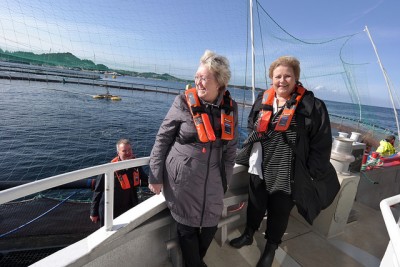After four years of a diplomatic freeze between Norway and China, there recently have been a few signs of a possible crack in the ice. News last week that Norwegian salmon exports to China can continue came as Finance Minister Siv Jensen had a bilateral meeting with a top Chinese official in the country’s own finance ministry in Washington over the weekend. China also remains keen on gaining a foothold on Norway’s Arctic archipelago of Svalbard, which can give Norway more leverage.

Russia isn’t the only recently contentious country eager to boost its presence on Svalbard and in the Arctic. China has been eager to gain influence and position in the Arctic for years, with Norway recently allowing it into the cold. Chinese investors have also been among those interested in buying some of the last few privately owned land on Svalbard. That raises concerns, though, and the government has stepped in with plans to buy up the land itself.
Salmon boycott eased
The most concrete good news regarding Chinese relations (frozen since the Norwegian Nobel Committee awarded the Peace Prize in 2010 to dissident Liu Xiaobo) came just before the weekend. Fisheries Minister Elisabeth Aspaker announced that Chinese authorities had agreed to accept new proof that Norwegian salmon met international health and safety standards and would not contaminate other Chinese seafood.
“After a constructive dialogue between Norwegian and Chinese authorities during the past month, we now agree,” Aspaker said in a prepared statement. “I’m extremely pleased by this. It means that exports of salmon to China can continue.”
China’s order last month banning imports of Norway salmon from the counties of Sør-Trøndelag, Nordland and Troms, because they allegedly were found to contain the ILA virus, manifested the diplomatic crisis between Norway and China. It reportedly had been difficult to arrange meetings with the Chinese and Aspaker said there still were “challenges” ahead. “We therefore must be prepared that the situation will be difficult and somewhat unpredictable,” she warned, noting that exports from Sør-Trøndelag, Nordland and Trom were still banned for now. Salmon exporters, however, were optimistic.
“A new health certificate for Norwegian salmon makes it possible to continue the Norwegian export to China,” Sigmund Bjørgo, leader of a Norwegian salmon promotional campaign, told Aftenposten. At least all Norwegian isn’t banned, and efforts continue to remove all trade blockage.
Finance minister’s breakthrough
Another government minister, Siv Jensen, also had a breakthrough of sorts when she met another finance ministry official from China. She also claimed to have had a “constructive” meeting in a “good atmosphere” after confirming to Aftenposten that the meeting had taken place.

The meeting followed China’s acceptance of Norway last week as a member of its new Asian Infrastructure Investment Bank (AIIB). Jensen called it “purely a bilateral meeting” at which she stressed how Norway’s experience in setting up its huge sovereign wealth fund can be useful for the new bank. Norway, which has a hyper modern banking system that’s almost entirely electronic and online, can also offer technical competence to the venture. “If the Chinese are interested, we can contribute,” Jensen told Aftenposten.
Foreign Minister Børge Brende wouldn’t comment on the significance of Jensen’s meeting with Chinese officials but said that “we want good relations with the Chinese. It’s positive that we have conversations in areas where we have shared interests.” News also broke last week that despite the four-year diplomatic freeze, Norway’s trade with China has continued to grow.
Sticky situation on Svalbard
Tensions remain, however, and China’s interest in Svalbard, along with Russia’s, raises concerns. The Norwegian government is firm in its sovereignty over Svalbard, under the terms of an international treaty from the 1920s, and it officially owns around 99 percent of the remote group of Arctic islands. It’s not keen on China gaining a foothold by buying up a Bergen family’s private real estate that’s up for sale and includes coal resources on Svalbard. Senior researcher Marc Lanteigne at the Norwegian foreign policy institute NUPI told Aftenposten that with both the US and Russia as major Arctic players, China needs to be more humble as a newcomer than it otherwise might be. It will likely keep up the pressure to play a role in the Arctic because of its need for natural resources and desire for influence in the area.
On a smaller scale, Chinese real estate investor Po Lin Lee is also among those showing a special interest in the Arctic. She told Aftenposten that she’s promoting Svalbard to newly wealthy Chinese as a tourist destination and she recently won approval to build a new hotel in the center of Longyearbyen, the main settlement on the island of Spitsbergen.
China has also been actively involved in promoting and using the new Northeast Passage maritime route, made possible by literally melting Arctic ice. China, meanwhile, has researchers stationed on Svalbard, studying everything from climate issues to the environment and atmosphere, but Chinese officials were turned down in their efforts to build a new large radar antenna on Svalbard because Norwegian authorities feared more spying.
newsinenglish.no/Nina Berglund

